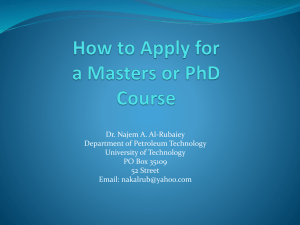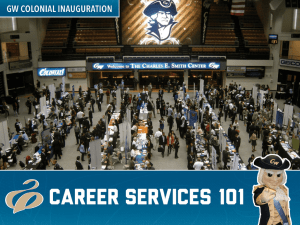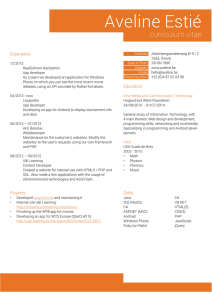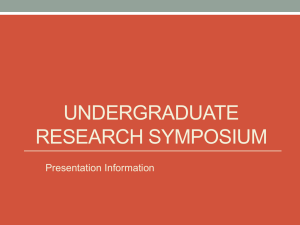Chemistry Department
advertisement
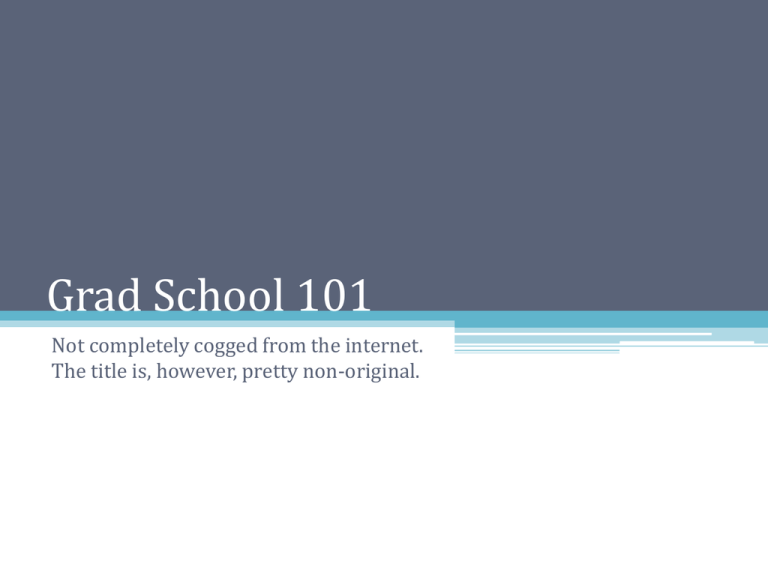
Grad School 101 Not completely cogged from the internet. The title is, however, pretty non-original. What you need – Min Requirements 1. 1-2 internships 2. 3 Good Recos 3. GRE, TOEFL, Subject GRE (Chemistry)[Physics or Biochemistry GRE can be taken if you are keen to apply in those fields] 4. <= 2 fields of focus (for internships, MSP, Seminar) 5. Decent CPI (> 8 would be nice, > 9 is enough to get you top apps if you have the other 4) Timeline • First Year Concentrate on coursework, try to maintain an 8 above CPI from the first year Think about your career goals, and whether you want to go to graduate school • Sophie Year Learn more about the department and see what area you would like (Organic, Inorganic, Physical, Biochemistry) Internship either locally at IIT or abroad .Good to get one reco secured, maybe even a publication • Third Year During the semester try to work in a lab of choice Internship either locally or abroad. Try to work in the field which you would like to pursue in your further research • Fourth Year Seminar/ Electives/GRE/TOEFL Consult the professor for MSP Can go for an internship abroad if your professor consents • Fifth Year Apps, MSP GRE/ TOEFL before October if pending Subject GRE in November First Year / Second Year • First year end: Go home! If enthusiastic, read about different topics or talk to people about it • Second year: Imp. Courses: Pay attention! Talk to Seniors about projects in department during the semester Internship after second year advised Start looking at your fields of interest ( You will be exposed to courses and labs) Maintain your CPI above 8 Third Year • • • • Start searching for internships in August, September More courses in department to find out your intersts Improve your CPI Try finding a project to do in the department during the semesters Fourth Year • • • • • Choose your electives according to interest Seminar topic and professor should be reflective of your interests Search for internships from august/september if you are interested in a summer internship and get the consent of your MSP supervisor If you are giving GRE in the second semester of the fourth year start preparing TOEFL can be given a month after GRE Fifth Year • Give your GRE/TOEFL before October • Prepare for Subject GRE(exam in India is usually in November first week) • Work hard on MSP and keep the professor happy • Be ready with a list of universities and professors • Work on your applications Fields of interest • You need upto 2 fields of interest to app • Common ones at IITB Organic Inorganic Physical Biochemistry • Other fields Nanomaterials Chemical Biology Fields of interest (contd) • More the better, but too much is bad • One sub-dept decides to take you • Two is good to diversify [Organic, inorganic, physical, computational(good to simultaneously work on biological applications), biochemistry] • Ideally, the two should have some solid connections that you can emphasize in your SOP • Not completely binding later on, unless you app to a prof or to a particular group (depends on univ) • Better to app in areas you have worked on • Choose 2 fields wisely asap! Fields of Interest and respective Profs • Organic synthesis: Kaliappan, Namboothiri, Rodney Fernandez, V. K. Singh, Suvarn Kulkarni • Inorganic: Lahiri, Balakrishna, H B Singh, Ravikanth, P Ghosh • Physical: Anindya Dutta, S N Dutta, Arindam Chawdhury, G N Patwari • Biochemistry: Pradeep Kumar, Ruchi Anand, Durani • Computational: Sunoj, Sashidar For remaining profs visit www.chem.iitb.ac.in MOST UNIVERSITIES OFFER ONLY PhD PROGRAMS IN CHEMISTRY Recommendation Letters Need 3. Be ready with more than 3 in case profs have a limit on the number of recos they can send Plan early. Start looking for these in 8th semester itself. Sources • • • • 2nd year internship guide 3rd year internship guide Seminar guide (Same as MSP guide ?) MSP guide 3rd year / 2nd year Winter internship guide (?) Course instructors (last option) Look for recos from researchers with enough experience in the field, PhDs from good US universities and in general successful (connections to univs you wish to app to is a bonus) Apping – What Matters CPI / DR Matters ENOUGH, but not as much as you may think Can be substituted with good research work High CPI + Decent-ish recos = a top-6 app • Recos Very important excellent reco from well known prof = damn good chance of a great app • Papers / Publications A good publication can do wonders for your application Good publication = good reco Too tough for a UG, atleast in some areas, don’t run behind publications. Good research work is always noticed • Apping – What Matters • Internships More the better Prof with whom you work more important than the place you work in It should be consistent i.e the field of research should not vary much • SOP Consult enough people and write good English A good SOP is essential to demonstrate your past research experiences and future goals Do not copy others’ SOP • GRE / TOEFL /Subject GRE Not important for good universities (1400 above is preferred, 100 above in TOEFL helps when TAship decisions are made) 800 above in Subject GRE is good, 900 above is excellent( it can compensate for lesser CPIs) Aim to do well enough for it to not show up as a black mark on your app Apping – What Matters (contd.) • Moral of the story: Univs look for research calibre Stuff which proves that, for example o Good recos from researchers to that effect o Good research internships and projects o Good academic background • Therefore, aim to maximize these qualifications: Take good internships, do good work and impress profs!! Apping – The Process • Number of univs to apply to: Varies with your profile App to enough places, but not too many Apply to places keeping the expenditure in mind • Coordinate: A person with similar profile and higher CPI would invariably be chosen over you, unless they are picking many people Good univs don’t take too many junta Try to have a different profile from others apping to the same place (else clashes will hurt) • Choice of Universities Aim high: app to places where you think you don’t stand a chance just for kicks, Apply to places where you have a decent chance of getting in As a backup apply to places where you will certainly get in 10 should be an upper bound for > 8.5 CPI junta, and 8-9 should be an upper bound for > 9 CPI junta. Apping – The process (contd.) • Choosing where to app: Places / groups / people that have similar research interest to yours DO NOT app to places where there is no one working on areas that you have worked on Customize your application to highlight the work you’ve done in the area of the group which you want to get into Choose univs which have more than one prof in the field you are interested in Talk to your guide and google for places that match your interests Overall goodness vs. Group goodness - Depends on what you are looking for o wanting to explore (not sure) vs. fixed on area o brand name / industry exposure / prospects / collaboration vs. good advisor / better research o Generally a good professor in a decent university is better than a bad prof in a top university as PhD is a prof- student thing Links to rankings of Grad programs in Chemistry • file:///C:/Users/DEEPTI/Documents/Applying %20to%20univs%20for%20Phd/Rankings/Top %20Chemistry%20Grad.%20Programs%20%20Web%20Ed.htm • US News website Apping – The process (contd.) • (More) Lessons learnt Choose MSP/Internship topics wisely. Avoid obscure/non-realworld topics (pick problems being worked on at the places you want to be when you graduate) Do enough research, start short-listing universities early Work with well known profs and show them your initiative and expertise => good recos, maybe paper, all are beneficial Work hard on acads, always helps to have something tangible on your app Take that extra step – attend conferences, meet people, look for opportunities to interact with potential gradschool advisors. This is not necessary but certainly helpful Apping – The myths • Extra curriculars matter • You need a +9 cpi to get into a top-6 place • I can loaf off in my fifth year and still expect to get a good app • Aim to publish at any cost • If I choose a field now, I have to do a PhD in it • Undergraduate time is for checking out as many fields as possible To Go, or Not to Go • Good Reasons to Go Enjoy research Want to teach at the college level Careers with more autonomy Deep interest in and dedication to a single area More challenging work (?) • Not Such Good Reasons What else will I do next year? Make more money Prestige of another degree Pressure from family, friends, others Financial Issues • Funding? Ph.D. students are generally supported financially • Types of Funding Teaching Assistantships Research Assistantships Fellowships To Go Now, or To Go Later • Now Your TA salary looks big compared to actually paying tuition! More family responsibilities later Larger peer group Might lose interest in pursuing PhD if you defer • Later More professional experience Greater focus Financial considerations Take a break from school to avoid burnout General Advice • Nothing is permanent! If you take a job, you can always go back to school If you decide grad school isn’t for you, you can always get a job Either way, don’t burn your bridges • Be flexible Many people change research areas Program might take longer than you expect • If unsure, you might as well apply and decide later • Applications can be deferred by a year. Check university website for the procedure and make your decision after consulting seniors Best of Luck


